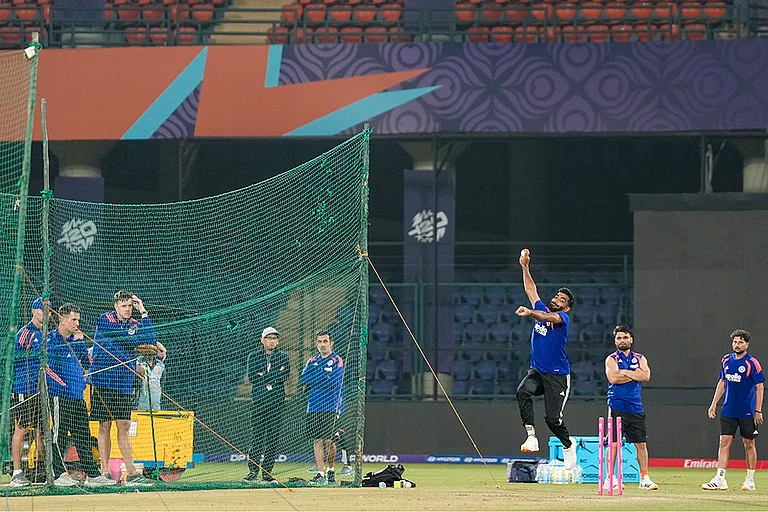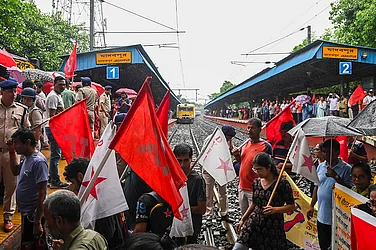At the heart of the Yogi Adityanath-led Bharatiya Janata Party’s policing tactics against what it describes as “mafia criminals” in Uttar Pradesh, has been the unfettered use of a special law which allows the administration to seize property of those designated as gangsters.
Former Samajwadi Party MP Atiq Ahmad, who had a tainted past with numerous criminal cases lodged against him over the years, was one of those who bore the biggest brunt of The Uttar Pradesh Gangsters and Anti-Social Activities (Prevention) Act, 1986 under the Yogi rule.
The government demolished and seized property of several hundred crores belonging to the jailed Atiq under the Gangsters Act before he was killed along with his brother Ashraf in police custody on Saturday evening in Prayagraj by three assailants in full media view.
In fact, since the BJP came to power in the state in March 2017, police data updated till March 2023 shows, they lodged 20,068 FIRs under the Gangsters Act and arrested 64,039 persons under the stringent law.
During the same period, police shot dead at least 183 persons in alleged exchange of fire—the police describe them as ‘encounters’, a definition often contested by human rights activists, who allege these operations are staged killings rather than spontaneous shootouts—while till mid-March 2023, 4,947 persons were injured in these incidents.
Police also said that 13 cops were killed and 1,428 were injured in these operations since 2017.
UP police data also claims that since 2017 they have seized, demolished or freed immovable and movable assets acquired through illegal means worth a massive Rs. 9,162 crores.
The UP Gangsters Act, as it is better-known as, defines a gangster as a member or leader or organizer of a gang and includes any person who abets or assists in the activities of a gang.
According to the act, a gang is a group of persons who act either individually or collectively by violence or threat or show of violence or intimidation or coercion with the object of disturbing order or gaining any undue temporal, pecuniary, material or other advantage for himself or any other person.
Section 14 of the contentious Act empowers the district magistrate to attach properties of alleged gangsters.
Under the Yogi Adityanath government, this clause has been used without restrain not only against suspected criminals and designated ‘mafia’ but also against Opposition party leaders and MLAs, as well as ordinary citizens. Most recently, the Yogi Administration in Jhansi seized properties worth Rs 130 crore belonging to former Samajwadi Party MLA Deep Narayan Singh under the Gangsters Act.
The government also seized two properties belonging to prominent SP legislator Irfan Solanki of Kanpur in Noida and Ghaziabad under the same law. Solanki was arrested and lodged in jail in a land grab case.
If the District Magistrate has reason to believe that any property, whether moveable or immovable, in possession of any person has been acquired by a gangster as a result of a commission of an offence triable under this Act, he may order attachment of such property whether or not cognizance of such offence has been taken by any court, Gangsters Act says.
Governments have often been accused of slapping the Gangsters Act to settle political scores and suppress opponents. In 2020, a bench of Justice Dinesh Singh of the Allahabad High Court noted that “provisions of the Gangsters Act are being misused thoroughly in the State of U.P by the police.”
Justice Singh was hearing a bail application of a Hardoi-resident Kapil Raidas who had been booked under Section 2/3 of the Gangsters Act. The police had recovered some cigarette packets and Rs 6,600 from Raidas and claimed that the amount found on him came from three thefts he had allegedly committed. The investigating officer’s claims did not sit well with the Court.
“This is not a single case where the Court has been confronted with bogus, unbelievable and impossible story set up by the police to implicate one accused in several cases and then invoke the provisions of the Gangsters Act. The Court prima facie is of the view that the provisions of the Gangsters Act are being misused thoroughly in the State of U.P by the police in this manner,” said Justice Singh in September 2020.
In separate cases in 2021 and 2022, the Allahabad High Court, however, also observed that an FIR under the Gangsters Act could be lodged on the basis of the involvement of an accused in a single previous case. In July 2021, the UP government filed an affidavit in the High Court justifying invoking the Gangsters Act against a journalist and five others in Maharajganj district. In December, 2022, a lawyer filed a plea in the Supreme Court challenging the constitutional validity of the UP Gangsters Act.
However, Yogi Adityanath’s strong-arm policy against suspected criminals has been widely endorsed by his party’s central leadership, and as election results show, also by the public in UP. In December 2021, months before the state went to vote in the 2022 Assembly election, Prime Minister Narendra Modi himself at an event in Balrampur hailed Yogi’s law and order tactics.
Modi accused previous governments of protecting “mafia,” promoting “bahubalis” and illegally grabbing land. In contrast, Yogi’s government was engaged in the “safai” (wiping out) of mafia and executing heavy fines on and using the bulldozer against such mafia, said Modi.





















